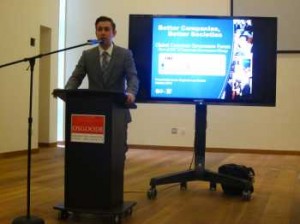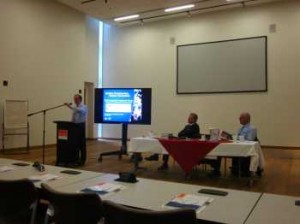MICHAEL CAPITANO
<Contributor>
 On October 3, 2012, the Osgoode Society for Corporate Governance (OSCG) held its inaugural event, “Corporate Governance Beyond Borders”, a panel discussion on corporate governance in emerging markets with two internationally-renowned experts on corporate governance: Philip Armstrong (Head of the Global Corporate Governance Forum, International Finance Corporation) and Peter Dey (Chairman of the Private Sector Advisory Group). The panel was moderated by Osgoode’s own Professor Peer Zumbansen. Philip Armstrong and his colleague, Alexey Volynets, who are both based in Washington, D.C., flew to Toronto especially for this event. Their attendance represents a milestone for the OSCG as it has crystallized our partnership with the Global Corporate Governance Forum. The OSCG will provide support to the Forum in their work that supports the development of good corporate governance practices across the world.
On October 3, 2012, the Osgoode Society for Corporate Governance (OSCG) held its inaugural event, “Corporate Governance Beyond Borders”, a panel discussion on corporate governance in emerging markets with two internationally-renowned experts on corporate governance: Philip Armstrong (Head of the Global Corporate Governance Forum, International Finance Corporation) and Peter Dey (Chairman of the Private Sector Advisory Group). The panel was moderated by Osgoode’s own Professor Peer Zumbansen. Philip Armstrong and his colleague, Alexey Volynets, who are both based in Washington, D.C., flew to Toronto especially for this event. Their attendance represents a milestone for the OSCG as it has crystallized our partnership with the Global Corporate Governance Forum. The OSCG will provide support to the Forum in their work that supports the development of good corporate governance practices across the world.
In case you wanted to attend this event but missed it, it has been recorded and will be posted on our YouTube channel: OsgoodeSocCorpGovern. A copy of the visual presentation used at the event by Philip Armstrong will be available once our website is up and running at www.oscg.ca. For more information about the Forum and our speakers, check out www.gcgf.org.
But first, before I get into the details, if you haven’t a clue what corporate governance even is, don’t fret. Because, as Professor Zumbansen pointed out at the event, as long as we’re asking questions, we can all be experts. So, instead of asking “What is corporate governance?”, it is more informative to ask substantive questions like: “How should corporations be governed? What is at stake? To whom are corporations responsible and what are they responsible for?” Questions like these get us thinking. If any of us were to answer that initial question, the answer would be something like: “Corporate governance is a set of rules, regulations, laws and guidelines that direct corporations to engage in best practices to maximize return on investment for their shareholders.” It doesn’t really generate any discussion. I merely stated a fact. But it does raise the question: “Is that all there is to it?” To that question my answer is an emphatic “no.” And really, why would it be that simple? When it comes to deciding what those best practices should be, context matters and we should not take a one-size-fits-all approach to different economies.
 Philip Armstrong started the presentation, titled “Better Companies, Better Societies,” with a case study on the Fukushima disaster, arguing that failure to understand risk, a lack of preparation against forces of nature to prevent meltdown, and poor management and relations to the public made this tragedy much worse. But why should corporate governance be concerned about a horrible socio-economic disaster, if the main purpose is to maximize investment for shareholders? It’s because corporate governance is shifting, moving away from shareholder value towards embracing a view of wider stakeholders: shareholders, employees, customers, suppliers, communities; basically any party that depends on that corporation.
Philip Armstrong started the presentation, titled “Better Companies, Better Societies,” with a case study on the Fukushima disaster, arguing that failure to understand risk, a lack of preparation against forces of nature to prevent meltdown, and poor management and relations to the public made this tragedy much worse. But why should corporate governance be concerned about a horrible socio-economic disaster, if the main purpose is to maximize investment for shareholders? It’s because corporate governance is shifting, moving away from shareholder value towards embracing a view of wider stakeholders: shareholders, employees, customers, suppliers, communities; basically any party that depends on that corporation.
If we look to the corporation in charge of the Fukushima plant, it’s easy to see why. The board of directors (the key actors in corporate governance) failed. There was no risk committee, minimal disclosure of board activities, and only 2 of 20 board members were independent from the company, which all translates to a lack of accountability. To make matters worse, technical data about the company submitted to regulators had been falsified! If Fukushima had made better decisions through the implementation of better governance practices, they could have drastically reduced the damage to the power plant and the surrounding communities caused by the unavoidable tsunami.
It has been shown convincingly that companies with good corporate governance practices see robust growth, good return on investment, and resilience to crisis. And that’s what we at OSCG and the experts at the Forum are concerned about. We don’t want a metaphorical Fukushima on our hands. Instead, we wish for both the corporations and the communities to gain from better corporate governance systems. If we want an example closer to home, we only need to look down south as the American economy continues to struggle in the aftermath of the financial crisis and the housing market collapse.
So where do we start when it comes to implementing best practices in developing markets? The real takeaway I got from the event is that it comes down to understanding the specific structure of the economy and needs of the society where the corporation is located. It’s not good enough to be satisfied with international standards, since they’re not context-specific. Following corporate governance guidelines cannot merely be an act of compliance, but interpreted as optimizing business practice, focusing on increasing quality of life for the community in which the corporation operates, and, in exchange, increasing the quality of return on investment.
The Forum thus far has focused on capacity-building, in order to transform the private sector into an engine of communal growth, reduce vulnerability to financial crisis in developing and emerging markets, and provide incentives for corporations to invest and perform efficiently in a transparent, sustainable, and socially responsible manner. This has involved identifying corporate governance risks and opportunities, nominating board members for selected clients, developing and promoting corporate governance methodology, improving director training organizations, and promoting codes and regulations to help raise standards and drive reform.
Even though this sounds nice, driving change in corporate governance practice is a work in progress. Our speakers concluded the event by voicing their worries to us. Peter Dey expressed his concern about how reform needs to occur, reiterating that the private sector needs to understand that embracing corporate governance creates shareholder value and that the market itself needs to lead the reform. Philip Armstrong noted, however, that more rules will not fix the problem, citing that in 70% of cases, there are failures enforcing regulation structures. He suggested that we should first ask what mischief we’re seeking to prevent and see if we have the capacity to enforce prevention, while at the same time understanding the market incentives that can persuade us from one practice to the next and the best ways to adjust for it. The situation gets increasingly complicated when it comes to emerging markets because they are desperate for development. They don’t have the courage to reject bad investments, since a good one may never come along. There’s a complex trade-off in the economic climate between model principles, fostering growth, and maintaining profits for one’s company; it’s a challenge balancing the competiveness of investment and the good and bad risks that come with it.
If you were left with more questions than answers after reading this article, you’re not alone. I still have multiple of questions left unanswered after attending the event. But if corporate governance interests you, feel free to contact us at OSCG@osgoode.yorku.ca to join our mailing list. Thank you to those who came to our event and stay tuned for more events and opportunities ahead!
